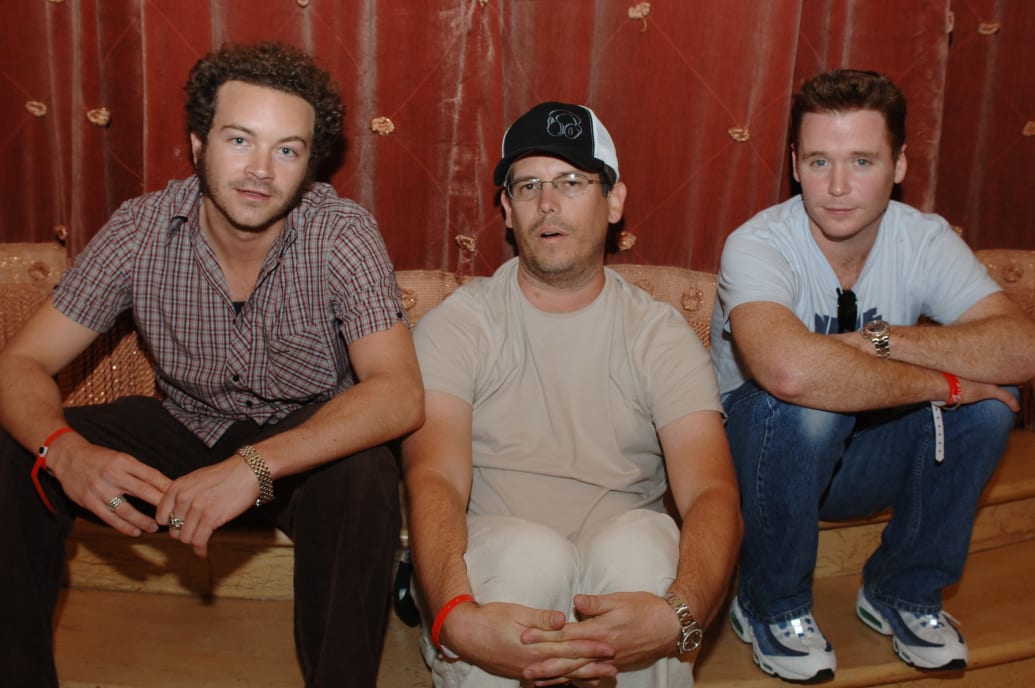See more: Feds Go After DiCaprio Pal Over Alleged $8M Debt
The IRS says Hollywood producer Chuck Pacheco spent millions on art, cars, and poker instead of paying the government. He says it’s “BS.”

You might recognize Hollywood bigwig Chuck Pacheco as a member of Leonardo DiCaprio’s so-called Wolf Pack, or, as it is alternatively known, the “Pussy Posse.”
Pacheco, who is not only a producer, but a high-powered talent agent and sometime actor—he has appeared in The Hangover and Entourage—has worked with Martin Scorsese, Bruce Willis, Mike Tyson, and Elvis’ granddaughter Riley Keough, and runs in the same circles as Ben Affleck, Nick Cassavetes, and Woody Harrelson. He has made headlines for, among other things, tangling with paparazzi while partying with Jamie Foxx.
But there appears to be a far less-glittery side to Pacheco’s seemingly charmed life. According to a bombshell search warrant affidavit obtained by The Daily Beast, the movie mogul also allegedly owes nearly $8 million in back taxes to the IRS, which has been unable to get its money because Pacheco claims he’s broke.

While Pacheco’s tax preparer was telling the government that his client “had a bad year… and has no money,” federal investigators say Pacheco, whom they describe in the warrant affidavit as “an avid gambler,” is as flush as he’s ever been, instead having spent many times the amount of his outstanding tax debt on fine art, fancy cars, and Las Vegas card tables. (The IRS says it has been trying to collect from Pacheco for so long, the original revenue officer assigned to the case has now retired.)
The ongoing investigation into Pacheco’s alleged criminal activity has not been previously reported. The feds accuse him of a laundry list of violations, including conspiracy to defraud the United States of America, money laundering, bank fraud, false statements, tax evasion, subscription to a false tax return, aiding and assisting in the preparation of a false tax return, and attempting to interfere with the administration of internal revenue laws.
“We have no comment,” Ciaran McEvoy, a spokesman for the U.S. Attorney’s Office in Los Angeles, where the investigation is taking place, said in an email on Friday.
Pacheco has not been charged, according to court records. McEvoy declined to provide additional information about whether any charges are in the offing.
Pacheco referred The Daily Beast to Nathaniel Hochman, the attorney representing him in the matter. Hochman declined to comment on the record for this article or to make Pacheco available for an interview.
However, a source close to Pacheco who has direct knowledge of the situation called the case “total BS.” The IRS has “mischaracterized” parts of the narrative included in the affidavit, according to the source, who told The Daily Beast that Pacheco disputes the exact amount he owes, believing his actual liability is less than $2 million.
Pacheco, the source said, has already had his paychecks garnished for more than $700,000 and has more than enough equity in the multiple homes he owns to cover his debt completely.
“Chuck didn’t do what they’re saying he did,” the source argued. “He just didn’t. The government has not brought criminal charges in almost two years. If they thought this was such a strong case, they would have brought the case two years ago.”
For its part, the IRS says Pacheco made a few scattered payments that failed to make a dent in his obligations, and has been ducking its agents ever since.
The IRS processes some 130 million individual tax returns annually, but resources are tight and enforcement is selective. In 2023, the agency’s Criminal Investigations division (IRS-CI) opened just 104 cases. Accordingly, the IRS focuses its limited resources on going after high-profile names, in large part, to create a deterrent effect on others thinking about shortchanging Uncle Sam. Criminal prosecutions of A-listers tend to make headlines, as do those involving B-listers, C-listers, and even D-listers. The IRS Criminal Investigations division boasts an 88.4 percent conviction rate, explaining, “Publicity of these convictions provides a deterrent effect that enhances voluntary compliance.”
In October 2015, Pacheco filed a tax return for the previous year, claiming net income of $19,238,098 from gambling, and withholding in the amount of $60,852, according to the affidavit. It says Pacheco calculated he owed the IRS a total of $7,102,674 for 2014, which took into account a $100,000 payment he had already submitted.

Having not gotten payment, an IRS revenue officer called Pacheco’s tax preparer, a Woodland Hills, California CPA-cum-lawyer named Jeffrey Helfer, who “allegedly committed numerous acts to evade payment of the taxes due and owing to the IRS and to obstruct its collection efforts of Pacheco’s 2014 tax liability,” the affidavit states.
“Since April 2016, Helfer made false statements to the IRS on behalf of Pacheco that included that he did not have access to Pacheco’s financial information, and that Pacheco was financially unable to pay his taxes,” the affidavit alleges. “For years, Helfer delayed the IRS’s collection efforts for Pacheco by promising returns and documents to the IRS.”
Helfer did not respond to The Daily Beast’s requests for comment.
The revenue officer told Helfer that the IRS had identified accounts in Pacheco’s name at Wells Fargo, Bank of America, JPMorgan Chase Bank and City National Bank “as sources from which [it] could potentially collect,” the affidavit says. The very next day, Pacheco formed an LLC called Nine Nights All-Star Weekend, registering it with the California Secretary of State as an entertainment company, the affidavit goes on. A week later, Pacheco began wiring money to a bank account controlled by Helfer, who the following month used a different account to wire several million dollars back to Pacheco, according to the affidavit.
In attempts to confuse investigators and keep his money “out of the reach of the IRS,” the affidavit claims Pacheco regularly transferred massive amounts of cash over the course of at least four years to Helfer, who stashed some of it in attorney-client trust accounts and sent some to bank accounts in Macau and Singapore; Helfer’s adult son, who is in the Christmas tree, jack-o’-lantern, and parking lot businesses; and a private investor he met through Helfer’s brother, an accountant.
The money was rapidly funneled back and forth through a series of short-term loans to Pacheco, all but one of which were not collateralized or formally documented, along with various accounts controlled by Helfer, who, the affidavit says, “often mov[ed] funds with no apparent purpose.”
“Based on what I learned through this investigation, I believe that Pacheco and Helfer were moving Pacheco’s money in this manner to avoid IRS levies on Pacheco’s accounts,” an IRS investigator writes in the affidavit.
According to the affidavit, when Pacheco received funds back from Helfer, he never used them to pay down his tax debt but, rather, “quickly disbursed them from his account to pay his debts at casinos or with gambling associates, buy art, or pay his American Express credit card bills.”
In one example, Pacheco bid $2,045,000 on a piece of art at a Christie’s auction on May 8, 2016, wiring the money roughly six weeks after that, the affidavit states. Although it provides no further details about the work in question, a review of the official auction results show only one piece sold that day, at that price: Tripod, a nine-foot fiberglass, resin, and steel sculpture by American contemporary artist Paul McCarthy.
On May 11, 2016, the affidavit alleges, Pacheco purchased another piece from Christie’s, this time with a $1,150,000 winning bid, at an auction that included works from the collections of publishing magnate S.I. Newhouse and Microsoft co-founder Paul Allen. The feds say Pacheco made good on the payment the following month, transferring the money from his All-Star Weekend account to a personal account at First Republic Bank, then wiring the funds to the auction house from there.
Pacheco also spent millions on artworks at Sotheby’s, outbidding others at a Feb. 10, 2016, auction in London, according to the affidavit. Investigators say he later wired a partial payment of $1,534,561.73 to Sotheby’s from his personal account at Wells Fargo, followed by another $1,379,431.86 to cover the balance.
The IRS says it tracked millions more that Pacheco used for personal luxuries over his IRS debt, listing, among a slew of other pricey expenditures, a $469,000 wire to the Bellagio Hotel & Casino in Las Vegas in Las Vegas, Nevada; a $939,000 wire to the Aria Resort and Casino, also in Vegas; and a $350,000 wire to luxury car dealership Whittington Motor Sports.
“The equity in the properties the IRS has liened [is] over $10 million,” the source close to Pacheco told The Daily Beast. “At any time the IRS could have enforced the liens, forced a sale of the properties, and paid itself in full. They have never done this and could do it today if they wanted. As such, it doesn’t matter what Pacheco… does with the rest of [his] money or assets.”
One of the “gambling associates” named in the affidavit is billionaire investor Alec Gores, who hired John Legend to perform at his star-studded December 2016 wedding to powerhouse writer/director/producer Kelly Noonan. In this instance, according to the affidavit, the money flowed only one way, to the tune of nearly $11 million from Pacheco to Gores, who is not accused of any wrongdoing.
Another gambling buddy is identified in the affidavit as Bosko Djordjevic, a Serbian “film director and cinematographer who participated in high stakes poker games.” Again, instead of paying the IRS, Pacheco in October 2016 wired $1.1 million to Djordjevic, and dipped further into his secret cash reserves that same month to wire $950,000 to the Bellagio.
A third, late businessman and poker icon Sam Magid, received a $110,000 check from Pacheco in 2017, according to the affidavit.
At a meeting with Helfer on Feb. 2, 2017, the IRS collection officer told Helfer that she planned to file liens a week later on Pacheco’s properties in order to satisfy his tax debt, the affidavit states. On Feb. 3, 2017, Pacheco sold his condo on the Las Vegas Strip for $1.1 million, according to the affidavit. The funds were deposited that same day into Pacheco’s personal account at Wells Fargo, after which he immediately “made multiple transfers” from there into three different business accounts he also maintained at Wells.
Soon after the IRS pushed forward with an intent to levy, the next step in the lien procedure, Pacheco moved more than $3 million from his personal accounts into ones controlled by Helfer, according to the affidavit. It claims Helfer then shifted much of the money back to one of Pacheco’s corporate accounts, which were not subject to the IRS levy, again frustrating the IRS’ attempts to collect, the affidavit says.
Helfer, according to the affidavit, would spend “years” promising the IRS that Pacheco’s subsequent tax returns “would include net operating losses that, when carried back, would result in no tax due for 2014. This never came to pass.”
In late September 2016, Helfer submitted Pacheco’s 2015 return to the IRS along with a form requesting a “tentative refund,” along with Pacheco’s “revised, second amended income tax returns for… 2013 and 2014,” according to the affidavit.
“However,” the affidavit contends, “even with the carried back losses, the 2015 form 1045 showed Pacheco’s tax liability for 2014 remained at more than $5 million.”
Helfer would continue running interference for Pacheco, telling the IRS over and over in 2016 that payment in full was on its way, according to the affidavit. The affidavit includes a slew of excuses Helfer floated for delay after delay, claiming, when an IRS representative inquired about why such a large balance remained due, that his cellphone was out of range and that he would call back when he got to the office.
“When [the IRS officer] called Helfer’s office at 10:45 a.m., Helfer’s assistant told her Helfer was out of the office at a meeting,” the affidavit states.
Later that day, Helfer called back and promised Pacheco “would send in a voluntary payment,” according to the affidavit. Helfer insisted that an IRS lien would “destroy Pacheco’s business opportunities,” and that Pacheco would make good on the tax bill within 60 days, it says. The following month, Helfer vowed Pacheco would be sending a check in a week, which allegedly never came. A month after that, Helfer swore payment “was forthcoming.”
Three weeks later, Helfer claimed to have sent a check for Pacheco but said “it must have been sent to the wrong office, thus, he would stop payment on that check and issue a new one,” according to the affidavit. In mid-January 2017, having not received any payments at all, the IRS officer on the case called Helfer, whose assistant said he was out of the country until the end of the month.
At the end of her rope, the affidavit says the IRS revenue officer handling the Pacheco case issued levies on “all known bank accounts held in Pacheco’s name.” Throughout 2017, the IRS continued to place levies on Pacheco’s bank accounts, and garnished his wages throughout 2018, “but got little to satisfy Pacheco’s tax debt.”

When the revenue officer retired in April 2019, Pacheco’s collection case was transferred to a new IRS employee, according to the affidavit. But having not received an updated power of attorney form from Helfer “for months after requesting it,” in March 2020, the new revenue officer showed up at Pacheco’s house, unannounced.
“In sum, Pacheco [said] he would apply for a payment plan to pay his outstanding tax debt and referred [the revenue officer] to Helfer,” the affidavit states.
A year later, the IRS still hadn’t received its money. In April 2020, Pacheco submitted a list of his assets to the IRS, claiming his eponymous corporation was worth $0, that he had about $250,000 in personal assets that consisted of “misc furniture/personal effects,” and that he did not own or lease any vehicles. Yet, according to the affidavit, Pacheco in fact had two leased Bentleys, and owned more than $9 million worth of art he bought between 2016 and 2020.
Around this same time, Helfer contacted the IRS, arguing that a series of deductions Pacheco had claimed in a number of revised tax returns newly submitted for past years in fact brought his total debt down to $1.8 million, according to the source close to Pacheco. But the IRS never told Helfer or Pacheco if they had accepted his claims, and wouldn’t confirm things one way or the other.
In the summer of 2022, Hochman, Pacheco’s attorney, met with the IRS and federal prosecutors, the affidavit states. Nearly two years later, the case still remains unresolved. Prosecutors this past week filed for an extension of time to search Pacheco’s AOL email account for further evidence backing up their allegations.
In the meanwhile, Pacheco is only getting deeper and deeper into the hole.
“As of June 29, 2023,” the affidavit states, “Pacheco’s personal liability to the IRS for tax year 2014 was $7,833,967.46.”


